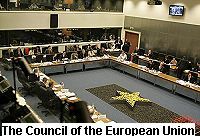Council calls for focused human resources strategy for research
While recent high profile developments such as the publication of programme proposals for research and innovation, and discussions with Japan on where to build a thermonuclear reactor, were on the table at the Competitiveness Council on 18 April, they were not the focus of attention. The principal topic of conversation, at the instigation of the Luxembourg Presidency, was human resources. 'We stressed the necessity of preparing consistent integrated human resources strategies focusing on four main themes: financing for training and the development of research as a career; improving the career outlook for researchers; promoting equality between men and women in science. And improving the general environment for researchers in Europe,' said Luxembourg's Minister for Culture, Higher Education and Research, François Biltgen. In this context, the Council welcomed the Commission's March recommendations on the creation of a European charter for researchers and a code of conduct for recruiting researchers, and invited the Member States to take account of the principles enshrined in the charter and the code of conduct when developing their own human resources, mobility and financing programmes. The Council also encouraged Member States to ensure that the charter and the code of conduct become well known nationally. The Commission was also set a task in relation to these recommendations - that of periodically communicating the results from the implementation of the charter and the code of conduct. Women and science was also the focus of much discussion at the meeting. 'It is possible to improve scientific excellence by promoting awareness of questions of equality between men and women and the equal treatment of the two sexes; evaluation and selection procedures should be transparent and should not make any distinction between men and women,' state the Council conclusions. Having reached agreement on the importance of gender equality within research, the Competitiveness Council invited Member States to provide disaggregated statistics on the participation of women in research, and to formulate ambitious objectives in relation to the participation of women in science, especially in the areas where they are most under-represented. Objectives should, in particular, target an increase in the number of women in management positions and working in industry. The ultimate aim should be to increase the overall percentage of scientific posts occupied by women within the EU to 25 per cent, agreed the ministers. For its part, the Commission is asked to continue efforts to increase the number of women taking part in EU research activities - not just in a researcher capacity within EU funded projects, but as evaluators, experts and members of consultative bodies. The Commission should also improve its 'women and science' activity by providing regular progress reports, according to ministers. Mobility was also tackled at the meeting, with ministers inviting all parties to work towards removing the obstacles to mobility. Both the Competitiveness and Innovation Framework Programme (CIP) and the Seventh Framework Programme (FP7) for research were welcomed by the Council. FP7 discussions focused on the general structure of the programme, collaborative research, human potential, and the simplification and rationalisation of the programme's implementation. A policy debate will follow at the next Competitiveness Council on 7 June, and in order to prepare for this meeting, ministers discussed the proposals for a European Research Council (ERC) and Europe's attractiveness for researchers. Another high profile item on the Council's agenda was ITER, the international thermonuclear experimental reactor, and more specifically the host site for the reactor. Ministers welcomed recent developments, and in particular Science and Research Commissioner Janez Potocnik's meeting with Japanese Minister for Education, Culture, Sports, Science and Technology, Nariaki Nakayama on 12 April. However, the Council's conclusions on the matter only reiterate the conclusions from the last meeting in November 2004, when ministers asked the Commission to intensify contact with the ITER partners with a view to concluding 'with a maximum number of partners within the envisaged timeframe, a six partner solution', which, the Council adds, is its preferred option. The Council also once again called upon the Commission to seek to finalise an agreement on the matter by July 2005 so that work may begin on the reactor's construction before the end of 2005. While the EU is eager to see ITER hosted in Cadarache in France, Japan wishes to house the reactor. The six parties involved in the project are divided over which location would be most suitable.



